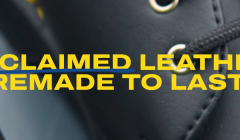
Dr. Martens champions sustainable fashion
Genix Nappa, a new material made of leather offcuts, aims to reduce waste

There are three bubbles that must be popped, if we are to liberate ourselves from being stuck in our ways and avoid the dangers of groupthink.

It is human nature to seek out people like us. People who talk like us, think like us, binge-watch the same shows as us and work in the same industry as us. It makes us feel comfortable, appreciated and sure in our knowledge that our way of doing things is the right one.
If you’re reading this article, it’s very likely that you are one of us and by definition not one of them. Unfortunately, if you work in marketing, it’s very likely that most of your customers are like them and not like us.
There are three bubbles that must be popped, if we are to liberate ourselves from being stuck in our ways and avoid the dangers of groupthink.
Where are you more likely to meet different kinds of people, the village of Tuxford in Lincolnshire, home to 300 people and several Labradors, or the city of London, home to nine million people?
Although the potential of meeting lots of different people is higher in London, how many do you actually talk to? Sat on the tube, headphones in, as you commute in the fastest way possible to your job, the number of human interactions minimised by waving a card at a machine to buy a coffee, the answer is close to zero.
By contrast, a village is a community of young, old, different types of work, different values all brought together not by their desire to get-a-big-job-in-marketing but pure geographical accident. And the expectation is that they all talk to each other, not just rush on past.
Break the Bubble: this one is quite easy. Leave the office, go to research groups all around the country, sit in your clients call centres; anything that means you’re not just talking to other Londoners.
The origin of the filter bubble phrase comes from technology. In their quest to shove more and more relevant ‘content’ through our eyeballs, the algorithms of the tech giants optimise to show us things they think we will like based on what we already like.
This traps everyone in bubbles of their own content, where once people might have read a newspaper containing a range of views, they now see their own personalised version of the truth that only references people they already agree with.
Break the bubble: a number of websites have tried to provide a range of views, rather than just one. I like looking at www.allsides.com where you get to see not an unbiased source of news but a range of viewpoints on every issue written by people who you won’t necessarily agree with.
There was a sudden realisation in 20th century psychology that the respondents for most studies were WEIRD: western, educated, industrialised, rich and democratic. And if you talk only to those people then your answers are probably going to be wrong for most people. Stanford undergraduates being very bad examples of most of human psychology. Likewise, when you have a marketing problem to solve and you just talk to people within your own company and discipline, you are probably going to get the same answers you’ve seen before.
Some time ago, working with a client selling a financial services product to the over 60s, we constantly reinforced the need for short and impactful copy. It wasn't until we started testing our ads, with people in their homes across the country, that we learnt long copy worked. These people had more time, they considered things, they wanted reassurance from information and their trust waned when a company looked like it was withholding information in their advertising. How could a group of twenty-somethings, with busy lives in central London, ever expect to understand how a pensioner in Liverpool was going to think and consume advertising without the benefit of getting outside their bubble?
Break the bubble: Get someone from outside the industry in to look at a problem differently. It could be a consultant, an artist, a hostage negotiator from the police, an ex-spy; anyone who could offer a different viewpoint and a new way of doing things.
Next week, make a promise to yourself to break one of these bubbles and find a different way of looking at things. Whether it’s geography, tech and news or just the agency, making a conscious effort to see and experience different views is a worthy end in itself.
At the end of the day you’ll still be one of us, but you might find it a bit easier to understand the needs, desires and wants of them.
Andrew Peake is the CEO & Alex Scott-Malden is Planner at the Media company, VCCP.
Looks like you need to create a Creativebrief account to perform this action.
Create account Sign inLooks like you need to create a Creativebrief account to perform this action.
Create account Sign in